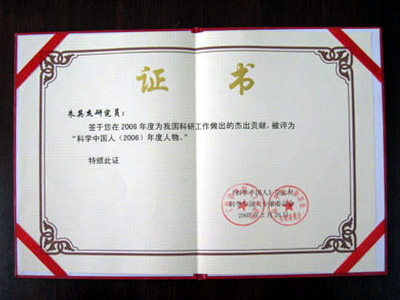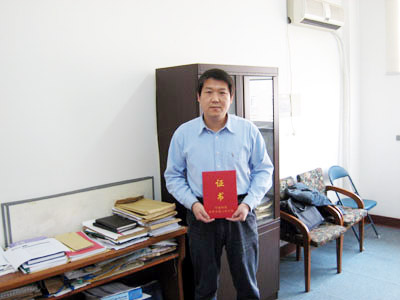Professor Ying-Jie Zhu was Selected as “People of the Year 2006” by the “Scientific Chinese” Magazine


Professor Ying-Jie Zhu from Shanghai Institute of Ceramics, Chinese Academy of Sciences was selected as "People of the Year 2006" by the "Scientific Chinese" magazine. "People of the Year 2006" was awarded to honor scientists who made important contributions to scientific research and technological progress in China in the year of 2006.
Nanotubes of important lead chalcogenides (PbS, PbSe, PbTe) semiconductors have very promising applications in the field of IR photoelectronic and thermoelectric devices. However, to explore simple, rapid, low-cost methods for the synthesis of lead chalcogenide nanotubes especially polycrystalline nanotubes is very important for their practical applications and is still a big challenge. Professor Ying-Jie Zhu et al. reported a novel biomolecule-assisted route to the synthesis of lead chalcogenide (PbS, PbSe and PbTe) polycrystalline nanotubes by the self-assembly of nanocrystals at room temperature. Polycrystalline nanowires assembled from the precursor nanocrystals were successfully prepared by using cysteine biomolecules at room temperature. A simple replacement route was designed to synthesize lead chalcogenide nanotubes using the precursor nanowires as both the lead source and the template. The advantages of this method are simple, rapid, low-cost, high-yield, energy-saving, and may be scaled up for large-scale production of lead chalcogenide polycrystalline nanotubes at room temperature.
The above-mentioned work was recently published in Angew. Chem. Int. Ed. 45, 7739 (2006). The referees commented:"The work by Zhu et al. describes an interesting approach using a template strategy to important 1-D semiconducting materials of lead…… The authors show nicely how the directed assembly approach can be used to synthesize important semiconducting materials of Pb chalcogenides." "The authors present a two-step approach to lead chalcogenide nanotubes……the combination of different "soft chemistry" techniques into a versatile preparative pathway to nanomaterials is an important step towards "design" processes in inorganic chemistry……such multi-technique strategies are likely to attract the interest of a broader readership, and their exploration with respect to other chemical systems is an inspiring perspective."



